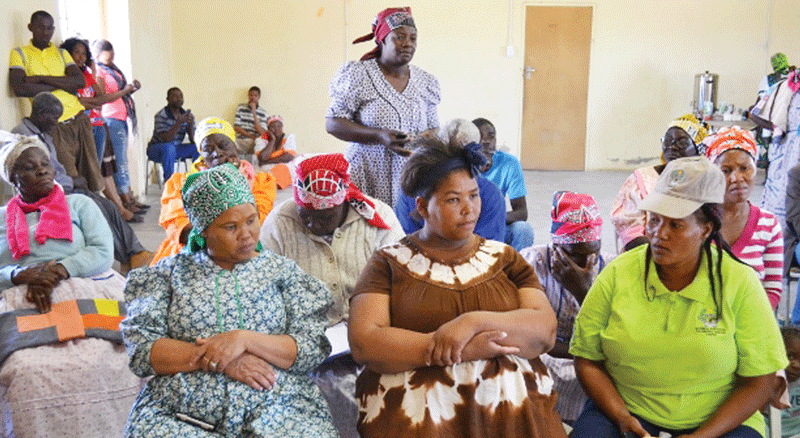
Hoachanas residents “chewing stones”

The residents of Hoachanas want to see the state of acute landlessness at their settlement to be presented as a “special case study” at the second Land Conference in November. This, according to them, is because they had lost 90% of their ancestral land during the colonial period.
According to Chief Kooper of the Kai //Khaun Traditional Authority who attended a Land Consultative Meeting held over the previous weekend by the Namibian Non-Governmental Organisations Forum (NANGOF) Land Reform working group, the Administrator General gave orders in 1923 that the entire Hoachanas community be relocated to the Aminuis reserve.
When the community refused, the Administrator General personally travelled to Hoachanas and instructed that the communal area to be reduced from 50,000ha to 14,000ha. He told the community they would starve and forced to chew stones.
The Land Reform working group is guided by Sima Luipert and Uhuru Dempers.
Luipert said that “civil society is disheartened and disappointed” that the most crucial resolutions taken at the 1st National Land Conference held in 1991 were not implemented.
This includes the resolution on the expropriation of land owned by absentee landlords and prioritising generational farmworkers for resettlement on farms bought by government, amongst others. “The same government that has committed itself to prioritising generational farmworkers, is the first to evict these farmworkers” she charged.
“It’s now twenty five years after these resolutions were taken without implementation. Therefore, it is important that we organise ourselves and prepare for the second land conference,” she added.
“This might be our last opportunity to take action and make our voice heard,” she said.
The consultative meetings are held in the eight regions affected most by colonial land policies, namely Hardap, Karas, Omaheke, Khomas, Otjozondjupa, Erongo, Kunene south and Oshikoto south.
According to Dempers the consultations started in Hardap and //Karas because of the many number of farms bought by Government through the resettlement programme.
Chief Kooper demanded that ancestral land talks be reinstated, issues of inheritance of commercial farms be addressed without delay, land sold to lodge operators be reviewed and communal support strengthened.
He maintained that the Hoachanas inhabitants, mostly the Namas should get preferential treatment for resettlement, because they lost large tracks of land during the colonial era.
“The resettlement programme is corrupt and is only aimed at disadvantaging us but they only resettle other tribes from other regions. This not productive as they don’t know the culture and farming in this area,” he said adding that they will organise themselves and march to Windhoek to petition the government.
“We are literally surrounded by large unproductive white commercial farms which are owned by mostly absentee landlords,” he said.
He said that they are going to demand that traditional area be extended more through the buying of absentee landlord farms.
Kooper claimed that resettlement farms bought since 2012 have been allocated to people from the northern regions of Zambezi, Kavango, Ohangwena, Oshana, Ohangwena, Omusati and Oshikoto.











































